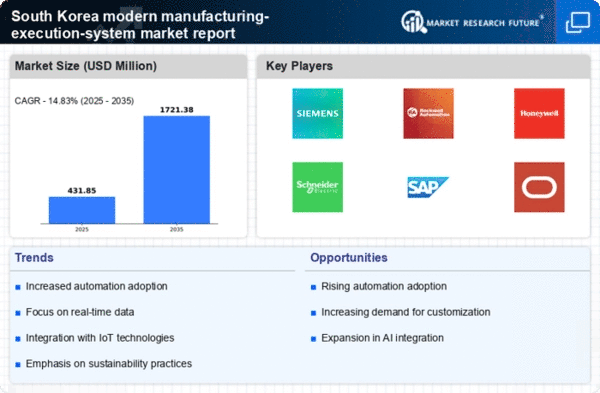Integration of Advanced Analytics
The integration of advanced analytics into manufacturing processes is emerging as a key driver for the modern manufacturing-execution-system market in South Korea. Companies are leveraging data analytics to gain insights into production performance, identify bottlenecks, and optimize resource allocation. This trend is supported by the increasing availability of big data technologies, which enable manufacturers to analyze vast amounts of information in real-time. As a result, organizations that adopt modern manufacturing-execution systems with integrated analytics capabilities can potentially improve decision-making processes and enhance overall operational performance. The market is expected to grow as more companies recognize the value of data-driven insights in achieving competitive advantages.
Government Initiatives and Support
In South Korea, government initiatives aimed at promoting smart manufacturing are significantly influencing the modern manufacturing-execution-system market. The government has launched various programs to encourage the adoption of advanced technologies, including manufacturing-execution systems. For instance, the Ministry of Trade, Industry and Energy has allocated substantial funding to support research and development in this area. This support is expected to boost the market, as companies are more likely to invest in modern manufacturing-execution systems when backed by government incentives. Furthermore, the South Korean government aims to increase the adoption of smart factories, which could lead to a projected growth rate of 15% in the modern manufacturing-execution-system market over the next five years.
Rising Demand for Operational Efficiency
The modern manufacturing-execution-system market in South Korea is experiencing a notable surge in demand for operational efficiency. Companies are increasingly recognizing the need to streamline processes and reduce waste, which is driving the adoption of advanced manufacturing-execution systems. According to recent data, organizations that implement these systems can achieve efficiency improvements of up to 30%. This trend is particularly pronounced in sectors such as automotive and electronics, where competition is fierce. As manufacturers seek to optimize production lines and enhance overall productivity, It is poised for significant growth. The emphasis on operational efficiency not only reduces costs but also enhances product quality, thereby contributing to a more competitive landscape in South Korea.
Shift Towards Customization and Flexibility
The modern manufacturing-execution-system market is witnessing a shift towards customization and flexibility in production processes. South Korean manufacturers are increasingly adopting systems that allow for rapid adjustments to production lines in response to changing consumer demands. This trend is particularly relevant in industries such as consumer electronics, where product life cycles are short. By implementing modern manufacturing-execution systems, companies can achieve a reduction in lead times by as much as 25%. This flexibility not only enhances customer satisfaction but also positions manufacturers to respond swiftly to market changes, thereby driving growth in the modern manufacturing-execution-system market.
Focus on Sustainability and Environmental Compliance
Sustainability is becoming a critical focus for manufacturers in South Korea, influencing the modern manufacturing-execution-system market. Companies are increasingly required to comply with stringent environmental regulations and are seeking ways to minimize their ecological footprint. Modern manufacturing-execution systems can facilitate this by optimizing resource usage and reducing waste. For instance, manufacturers that implement these systems can achieve reductions in energy consumption by up to 20%. This focus on sustainability not only helps companies meet regulatory requirements but also enhances their brand reputation among environmentally conscious consumers. As sustainability becomes a priority, the modern manufacturing-execution-system market is likely to expand in response to these evolving demands.
















